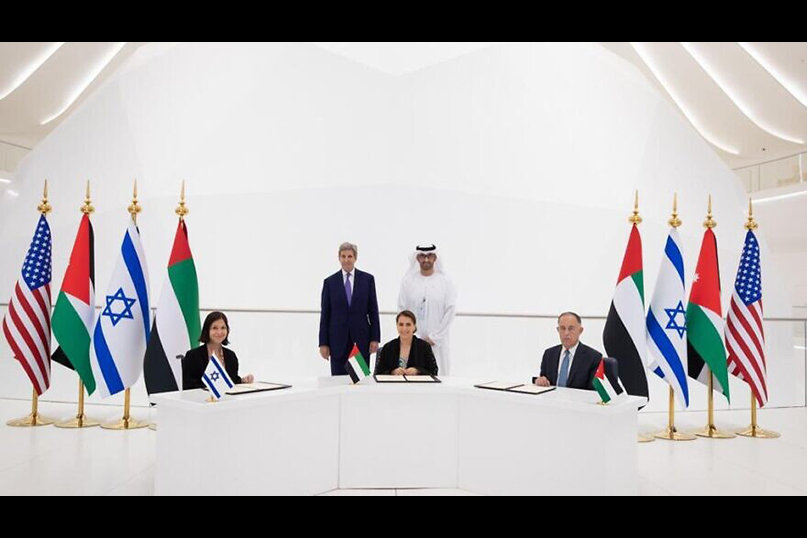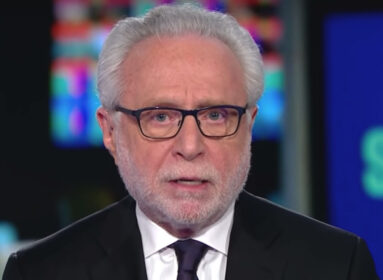
By David Isaac
(JNS) Israel, Jordan and the United Arab Emirates inked an energy-water deal on Nov. 22 that would see Jordan supply renewable electricity to Israel in exchange for desalinated water from Israel.
Israel’s Minister of Energy Karin Elharrar signed the deal, along with officials from Jordan and the UAE. At the signing was U.S. Special Presidential Envoy for Climate John Kerry.
“The declaration of intent that we are signing today is not just good for the State of Israel and the Hashemite Kingdom of Jordan, but for the region as a whole, and will send a strong message around the world about how nations can work together to battle the climate crisis,” said Elharrar.
The agreement consists of two components. The first, dubbed “Prosperity Blue,” involves the construction of a desalination plant in Israel “to supply Jordan with up to 200 million cubic meters of desalinated water.” The second, “Prosperity Green,” calls for the construction of a 600-megawatt solar plant in Jordan “with all clean power produced to be exported to Israel.” (The plant will be built and operated by Masdar, a UAE renewable-energy company based in Abu Dhabi.)
“It’s a win-win,” Sharon Hatzor, vice president of strategy, planning and policy for Israel’s Ministry of Energy, told JNS. “We can get green electricity, and a lot of it, and they get water.”
A 600-megawatt plant would provide a marked boost to Israel’s renewable-energy supply. “By the end of 2021, about 3,500 megawatts of renewable energy are expected to be installed in the Israeli electricity economy,” she said. If added today, a 600-megawatt plant would mean a 17 percent bump in Israel’s renewable capacity.
The deal’s main advantage to Israel is that it places the solar installation in Jordan’s desert. Solar farms are land-intensive, and unlike Israel, Jordan has plenty of empty space. Israel will need more such deals if it hopes to meet its renewable-energy target of 30 percent by 2030.
One critic of Israel’s renewable plan, Yakov Ressler, who is affiliated with Israel’s Environmental Rationality Forum, told JNS that he has calculated it would take 64 million solar panels for Israel to reach 30 percent renewable capacity.
“We are doing everything we can to reach our 2030 goals. We do have land, but we have to go dual-use inside Israel,” said Hatzor, noting that means putting panels on rooftops and employing agrivoltaics—the simultaneous use of land for solar power and agriculture. (She said Israel has a large pilot project in place studying the feasibility of agrivoltaics.) Hatzor said Israel’s land challenge will only increase as the population grows. In 2020, Israel had the highest population growth rate of any OECD country, according to World Bank data.
‘An association of mutual interests’
Oded Eran, former Israeli Ambassador to Jordan and currently a senior research fellow at the Tel Aviv-based Institute for National Security Studies (INSS), told JNS that “Jordan is in perennial need for water. The water shortage amounts to about 4 million cubic meters annually. And if you look around, there is only one source to replenish it: desalinization.”
Eran said the deal was “very positive and constructive from the point of view of the overall strategic relations between the two countries.”
“Stable and durable peaceful relations with neighboring countries, especially those that have a proximity with Israel, are best served by connecting grids, whether water, electricity or telecommunication. This creates an association of mutual interests,” he said.
“It is very easy to disconnect cultural relations or even diplomatic relations, but it’s more difficult to do it when your livelihood depends very much on the grids that you’ve created with a neighbor,” continued Eran. “This is certainly true about water and electricity.”
He criticized the Jordanian reaction to the deal, which saw Jordanian parliament members attack the agreement and protesters take to the streets to condemn growing “normalization” with Israel.
“What I’ve seen in the last 24 hours in Jordan is really annoying. There is strong resentment in, among other places, the Jordanian parliament,” said the former diplomat. Describing their behavior as “cheap political shots” and “playing with sentiments,” he noted that “those who criticize the deal cannot produce water from any other source.”
He expressed hope that the Jordanian government would have a serious discussion that would lay out the advantages to Jordan. “It’s not only Israel selling water, but Jordan selling electricity,” he said. “So this creates a mutual dependency and I think this is a very constructive way of looking at it.”
Main Photo: The signing of the memorandum between Israel, the United Arab Emirates and Jordan with U.S. Climate Envoy John Kerry, Nov. 22, 2021. Source: Twitter.







 Southern New England Jewish Ledger
Southern New England Jewish Ledger















